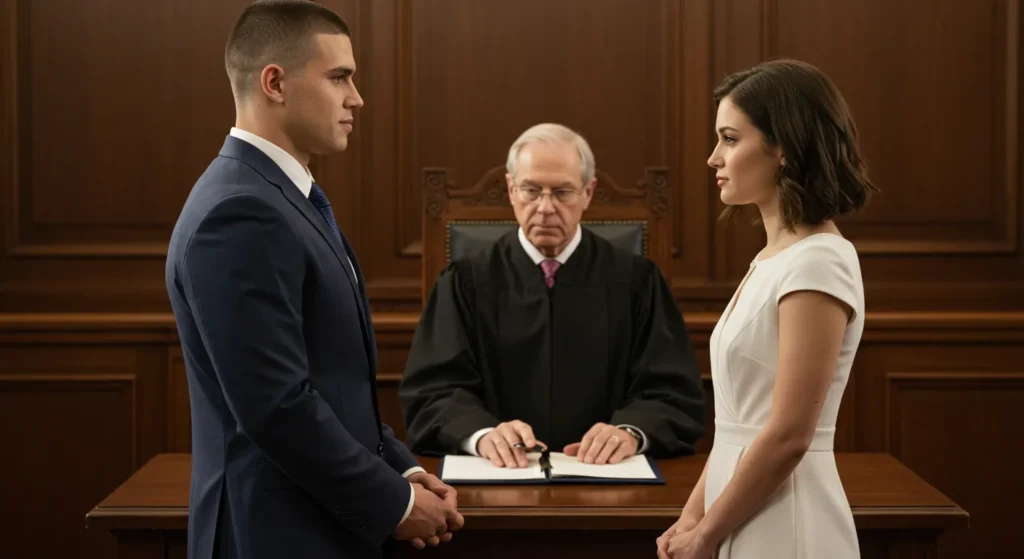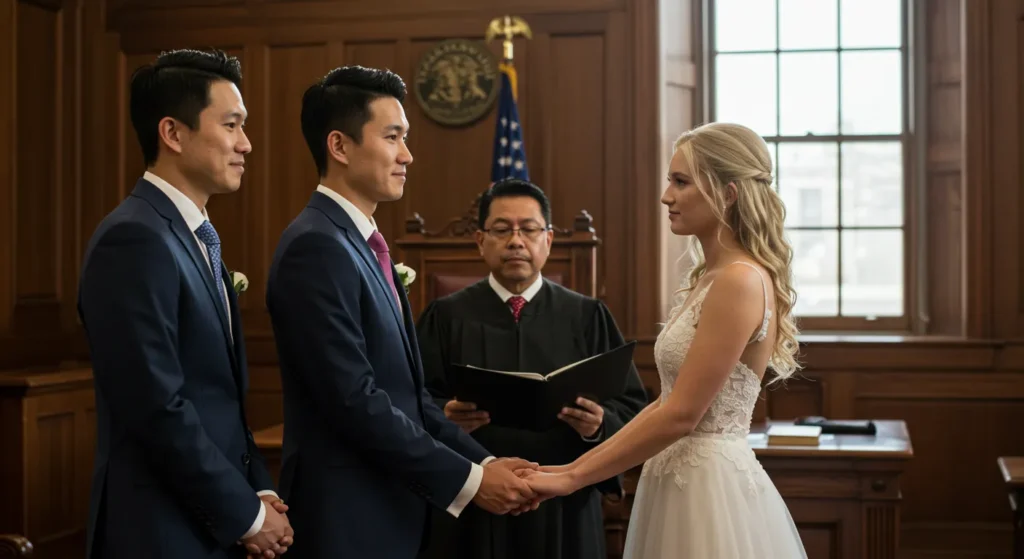Table of Contents
Curious about Does Maryland Have Common Law Marriage? Maryland’s laws are straightforward but nuanced when it comes to the recognition of unions elsewhere.
Here is an article that briefly describes what Maryland’s stand is about common law marriage, how it recognizes out-of-state unions, and legal implications for couples who would like some clear insight read on.
The Roots of Does Maryland Have Common Law Marriage
Does Maryland Have Common Law Marriage?, is often thought of as the original version of marriage dating back to the days when couples would just cohabit and take on the trappings of wedlock without any formal ceremony.
In colonial America, it developed as a practical alternative due to the absence of clerics or officials in inaccessible areas. In illustration, settlers in thinly populated areas mostly depended on mutual commitments rather than formal documentation. By 1855, a judge from New York highlighted its importance stating that a wedlock of ten years’ public cohabitation with issue should not be lightly put asunder, Does Maryland Have Common Law Marriage?
Maryland’s Clear Position

Common law marriages do not spring up in Maryland. A couple could live together for decades, could represent to the world as man and wife, but would not be considered legally married under the laws of Maryland.
Therefore, cohabitating couples do not assume spousal rights that include such matters as inheritance or insurance benefits. For example, a Baltimore couple who has been living together for 20 years is not recognized by the law as being married without going through a formal ceremony, Does Maryland Have Common Law Marriage?
Recognizing Out-of-State Unions
Though Maryland does not allow the creation of common law marriages within its borders, it recognizes those properly established elsewhere. For instance, if a couple was validly married under the common law rules of Washington, D.C. as decided in the 1967 case of Laccetti, Does Maryland Have Common Law Marriage?
Laccetti, they would retain their marital status in Maryland. This understanding secures couples coming from places such as Colorado or Texas, where the common law marriage has yet to elapse. For example, a couple from Denver could move to Annapolis and have their union acknowledged.
Legal Requirements in Other States
In places that recognize Does Maryland Have Common Law Marriage?, the couple usually must live together, mean to be married, and show the public that they are married. Each state makes its own rules; for example, Pennsylvania stopped recognizing new common law marriages after 2005 but does honor those formed earlier.
Consider a couple from Pennsylvania who stayed for two nights at a hotel in 1991, presenting themselves as married. The Maryland court recognized their union as valid marriage (Blaw-Knox Const. Equipment Co. v. Morris). These cases illustrate how, if the jurisdictional boxes are ticked, Does Maryland Have Common Law Marriage?
Rights of Common Law Spouses
In states that do recognize common law marriages, the spouses get benefits just as if it were a ceremonial marriage. Those include inheritance, Social Security, and health insurance among others.
Typically, proof or some sort of documentation or witness testimony is required to establish the validity of the marriage before any benefits can be conferred. e.g., a common law spouse in TX may have to prove regular public acknowledgment as husband and wife to be eligible for survivor benefits; such rights in MD accrue only if the marriage was duly celebrated elsewhere, Does Maryland Have Common Law Marriage?
Dissolving Recognized Unions
For out-of-state common law marriages recognized in Maryland, dissolution of the relationship would require some formal action at law comparable to a divorce or annulment. Mere separation does not suffice.
This is evident from cases wherein courts have granted decrees of divorce for valid common law unions.
Think about a pair from Oklahoma who shifted to Maryland͏- they’d have to lodge a case for separation to lawfully break their union, making sure rights like support or property sharing are dealt with. This steps keeps both sides’ lawful interests safe, Does Maryland Have Common Law Marriage?
Property and Cohabitation in Maryland

Maryland is an equitable distribution state. Marital property is distributed equitably, not equally. For unmarried cohabitants, property rights depend on how assets are titled in the state of Maryland because the state presumes against joint tenancy except when explicitly stated.
For example, a couple living together in Silver Spring who purchased a home together must specify ownership terms in the deed to the house. If that record does not exist, there will be a dispute if the relationship ends, Does Maryland Have Common Law Marriage?
Alternatives to Formal Marriage
In Maryland, couples who have avoided a formal marriage may wish to utilize commitment ceremonies-these have absolutely no legal bearing-or use cohabitation agreements to spell out property and support terms.
Most prefer the latter because it spells things out clearly, particularly in the event of a breakup or death. For example, Bethesda couples might draft cohabitation agreements to specify who gets their shared condo should they split. These arrangements give them peace of mind without holding it legally binding as a marriage, Does Maryland Have Common Law Marriage?
Registered Domestic Partnerships
The state of Maryland enables unmarried couples to enter into registered domestic partnerships (RDPs) for the purpose of inheritance, where rights equivalent to those enjoyed by a spouse are bestowed upon them.
The partners have to be above 18 years of age, and an RDP may be dissolved six months after one party has filed a termination declaration. This could serve the interest of a Rockville couple who want to ensure inheritance rights but do not intend to marry This is a reflection of Maryland’s effort toward untraditional relationship structures, Does Maryland Have Common Law Marriage?
Child Support and Divorce Laws
Maryland’s child support guidelines are of the 2010 version. The said guidelines defined custody types in terms of overnights with whom the child stays.
A one-year separation-in-house but without any sexual relationship is required for getting a divorce, except in some cases, e.g., adultery. A Frederick couple will most probably have to wait for twelve months to get divorced unless specific grounds are met. This ensures fairness in family law matters.
Tax Implications for Unmarried Couples
In Maryland, unmarried cohabitants are not allowed to file taxes jointly as married couples do. This has an effect on their financial planning since both parties will have to file individual returns probably missing out on some tax advantages that married spouses enjoy.
A couple living together in Columbia would be required to file separate returns thereby affecting deductions and credits. This highlights the legal distinction between marriage and cohabitation, Does Maryland Have Common Law Marriage?
Historical Context of Does Maryland Have Common Law Marriage

This clandestine 1215 marriage ban by the Catholic Church and more precise rules from the Council of Trent, 1545-1563, laid the paper trail for early marriage laws. In colonial America, common law marriage sprang from need filling in where formal ceremonies were not possible.
Does Maryland Have Common Law Marriage?. By 1885, Maryland courts were spotlighted for recognizing any type of valid marriage to protect families (primarily immigrant families). It is through this historical lens that one sees how long societal needs have influenced marriage laws.
Rising Cohabitation Trends
Cohabitation rose in the United States from 523,000 couples in 1970 to 1,560,000 couples by 1980. Recently, cohabitation reached 5,475,768—a72% increase over the past decade. The state of Maryland saw a 46.9% increase in the number of unmarried couples over that same span.
This all speaks to changing social norms where many more couples choose cohabitation rather than marriage. For example, young professionals in Baltimore might want flexibility rather than a formal commitment, Does Maryland Have Common Law Marriage?
Federal Recognition and Benefits
In a rule from the U.S. Department of Labor in 2015, it thus expanded the definition of a spouse under the Family and Medical Leave Act to include common law spouses, married in states where their marriage is recognized, effective March 27, 2015.
This will ensure that eligible employees have job protections. For example, if a common law spouse from Iowa goes to Maryland, they can use FMLA as long as their marriage is valid. Such federal changes widen safety nets for various family formations, Does Maryland Have Common Law Marriage?
Final Thoughts
Maryland’s take on common law marriage is straight: it does not permit new ones but honors those properly created in other places, as shown in cases like Laccetti v. Laccetti. Knowing does Maryland have common law marriage helps pairs deal with their lawful civil liberties (whether through separation, building agreements, or RDPs), Does Maryland Have Common Law Marriage?
For tailored support, talk to a family law attorney or see resources like the Maryland Thurgood Marshall State Law Library or get in touch with a local family law attorney to guarantee you are completely informed regarding your rights and choices.
FAQs
Does Maryland allow common law marriage?
No, Maryland does not allow the creation of new common law marriages. However, it recognizes those legally formed in other states.
Will Maryland recognize my common law marriage from another state?
Yes, if your common law marriage was legally formed in a state that recognizes it, Maryland will honor that marriage.
What rights do common law spouses have in Maryland?
Common law spouses from other states have similar rights as married couples in Maryland, including inheritance and survivor benefits, as long as their marriage was validly formed.
How can I prove my common law marriage in Maryland?
You may need documentation such as joint tax returns, affidavits, or public acknowledgment to prove the validity of your common law marriage in Maryland.
Can I get divorced in Maryland if I have a common law marriage?
Yes, if your common law marriage was recognized in another state, you can file for divorce in Maryland to legally end the marriage.






